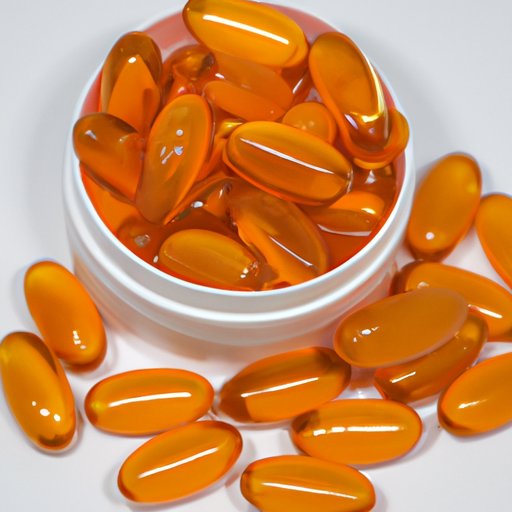
Introduction
Do you often feel sluggish or tired throughout the day despite getting enough sleep? Perhaps you rely on caffeine or sugar to power through your work day. Low energy levels can be caused by several factors, including poor nutrition, lack of exercise, and stress. However, one of the most effective solutions is to incorporate vitamins into your diet.
The Link Between B Vitamins and Energy: An In-Depth Look
B-complex vitamins play a crucial role in energy production. They help convert carbohydrates into glucose, which is then used by the body as fuel. There are eight different types of B vitamins, each with its own unique functions. Vitamin B1 (thiamine), for example, helps convert carbohydrates into energy and regulates the nervous system. Vitamin B6 (pyridoxine) is essential for brain development and function, while Vitamin B12 (cobalamin) plays a role in DNA synthesis and red blood cell formation.
Foods that are rich in B vitamins include whole grains, beans, leafy greens, and animal products such as meat, eggs, and dairy. If you’re not getting enough B vitamins from your diet, taking a B-complex supplement may be beneficial. It’s important, however, to consult with a healthcare professional before starting any new supplement regimen.
Wondering Which Vitamin Can Enhance Your Energy Levels Naturally? Meet Vitamin B12
Vitamin B12 is particularly important for energy metabolism. It plays a crucial role in the production of red blood cells, which transport oxygen throughout the body. Without enough Vitamin B12, you may experience fatigue and weakness, among other symptoms. Vitamin B12 deficiency is more common in vegetarians and vegans, as it is primarily found in animal products. However, fortified cereals and plant-based milk alternatives can also be good sources of Vitamin B12. If you’re concerned about your Vitamin B12 levels, consider speaking with a healthcare professional about getting tested or taking a supplement.
The Ultimate Guide to Vitamins for Energy and How They Work
While B vitamins may be some of the most important vitamins for energy, they are not the only ones. Vitamin C, for example, is an antioxidant that helps the body fight off environmental stressors. It also aids in the absorption of iron, which is necessary for the production of hemoglobin, a protein found in red blood cells that carries oxygen to the body’s tissues.
It’s important to note, however, that taking vitamin supplements is not without risk. Taking too much of certain vitamins can lead to toxicity and may cause adverse effects. It’s always best to get your nutrients from whole foods whenever possible. However, if you’re considering a supplement, it’s important to do your research and speak with a healthcare professional first.
How Vitamin C Can Boost Your Energy and Combat Fatigue
Vitamin C has many benefits for physical performance and recovery. It helps reduce muscle soreness and inflammation after exercise, and can improve endurance in athletes. Additionally, it may boost immunity and protect against oxidative stress caused by environmental pollutants.
Some of the best food sources of Vitamin C include citrus fruits, berries, kiwifruit, tomatoes, and bell peppers. Be sure to incorporate plenty of these foods into your diet to reap the benefits of this powerful antioxidant.
Top Vitamins and Supplements for All-Day Energy
There are many vitamins and supplements marketed for energy, but not all of them are created equal. Some of the most popular include caffeine, which is found in coffee, tea, and energy drinks, and creatine, which is commonly used by bodybuilders and athletes to increase muscle mass and improve performance.
However, both caffeine and creatine come with their own set of potential drawbacks and side effects. Additionally, they may not be suitable for everyone, particularly those with underlying health conditions.
Other popular energy-boosting supplements include Ginseng, Guarana, and Rhodiola, all of which have been shown to have some potential benefits for fatigue. It’s important, however, to speak with a healthcare professional before trying any new supplement, as they may interact with other medications or have potential side effects.
5 Healthy Foods Rich in Iron and Vitamin D That Boost Energy
Iron and Vitamin D are two nutrients that are essential for energy production. Iron helps transport oxygen throughout the body, while Vitamin D is important for bone health and immune function. Some good food sources of both nutrients include fortified cereals, leafy greens, beans, and fatty fish such as salmon. If you’re not getting enough of these nutrients from your diet, consider speaking with a healthcare professional about taking a supplement.
The Science of Vitamin D and Energy: How They’re Connected and What You Need to Know
Vitamin D has been the subject of much research in recent years, particularly regarding its potential role in energy metabolism. Some studies have suggested that low levels of Vitamin D may be associated with fatigue and decreased physical performance. However, the relationship between Vitamin D and energy is complex, and more research is needed to fully understand how they are connected.
It’s important to get enough Vitamin D, as it helps the body absorb calcium and maintain strong bones. However, it’s also important not to take too much, as excess can lead to toxicity. Speak with a healthcare professional to determine your recommended intake of Vitamin D, and consider getting tested to see if you have a deficiency.
Conclusion
There are several vitamins and nutrients that can help boost your energy levels naturally. From B vitamins to Vitamin C to Iron and Vitamin D, incorporating these into your diet can have a major impact on your overall well-being. However, it’s always important to speak with a healthcare professional before starting any new supplement regimen, and to prioritize getting your nutrients from whole foods whenever possible.





